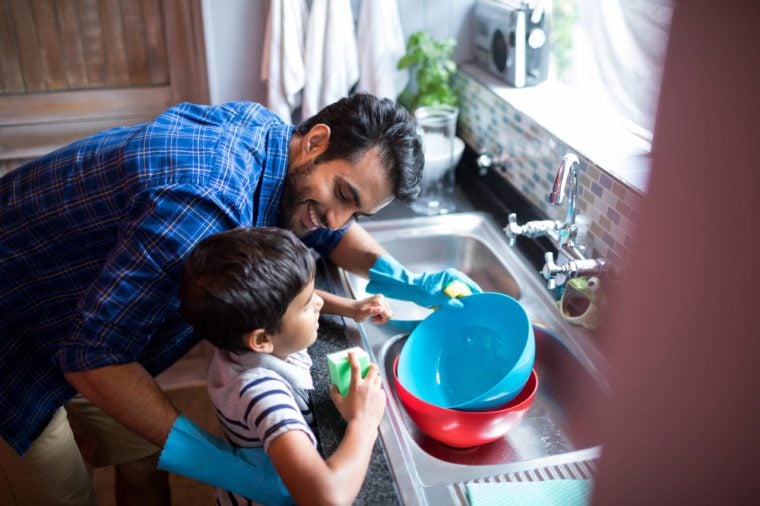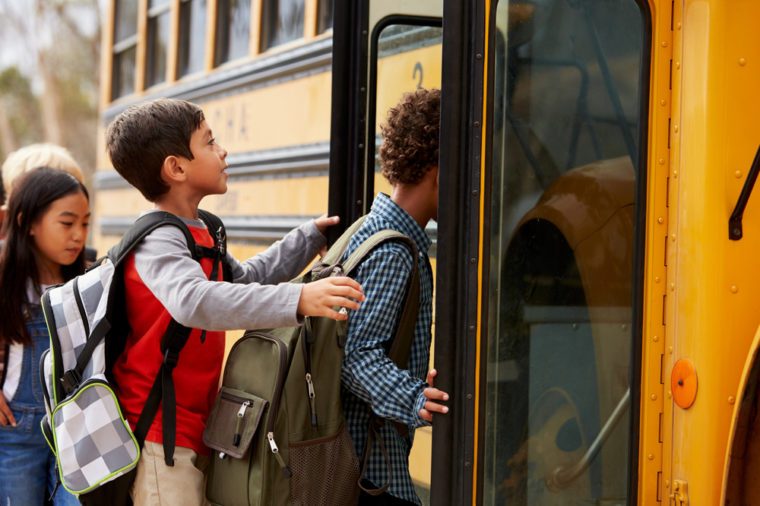Going back to school can be stressful for the whole family—arm yourself with these tips to have the smoothest back-to-school season yet.

Troubles with teachers, other students, or a class are just a few of the stresses that can keep kids from enjoying school—and often parents feel helpless to assist their children. Talking with your kids and understanding what’s adding to their stress is the first step in understanding what’s going on at school. By helping kids work through their stress you’ll teach valuable stress management tips that will help them throughout their lives.
Listen

The first step in helping your kids with school stress is to listen to what’s going on with them. Even if they aren’t talking, watch for non-verbal cues, or trust your instincts if your kid just doesn’t seem himself or herself. Begin the conversation by casually asking about school while you’re driving home, at the supermarket, or doing a chore around the house together. Don’t pressure them and refrain from pressing for answers.
Talk about homework

If they’re new to homework, discuss the work with them at the kitchen table or before they sit down to work. Talk about what is due tomorrow or next week and help them to plan out how to get the work done. Don’t focus on grades, but rather focus on completion and understanding the concepts of the assignment. Learning to manage their workload efficiently will help them not only succeed in school but in the workforce. Check out our 11 teacher-approved tricks to get your kids ready for the first day of school.
Establish a routine

Set a breakfast and morning routine that works for everyone. It may mean setting out plates and planning breakfast the night before or it may mean getting up a few minutes earlier to help ease morning stress. Try to make mornings calm and be enthusiastic about what’s planned for the day. Lead by example by happily sharing the plans that you have for your day.
Know the rules

Understand the rules that your child’s school has in place. What happens if they are late for class? Are electronic devices allowed? What is the dress code for school? Be attentive at parent meetings and understand the culture of the school so that you can have a solid grip on what’s expected of your child. Your understanding will help them better navigate demands and thrive at school. Make sure you read our back-to-school safety tips to ensure your child has the safest year ever.
“Un-Schedule” kids

There are wonderful extracurricular activities for your child, but it is just as important that kids take time to relax and have some unscheduled time at home or outdoors. Keep one weekday after school that is a “free day,” and stick to that schedule for the school year. Your child will be relaxed and prepared for the rest of the week when you allow him to have proper downtime. Don’t miss these genius back-to-school swaps that will save you money.
Teach your kids how to help out

Similar to establishing a routine, setting up designated chores for your child to do each week is an important part of learning responsibility and feeling independent. It can be tough to get your kids to do chores without an incentive, though. Create a sticker chart, give a few dollars as a monetary reward, or offer dessert if you don’t normally have sweets in the house.
Practice the school night routine before school starts

A week or two before the school year starts, begin settling down a bit earlier at night. Push your activities up 30 minutes or so to get your family re-acclimated to what the school nights will look like (yes, that means powering down electronics earlier, too). They might complain at first, but it’ll benefit them in the long run. After all, practice makes perfect!
Plan a weekend away

The end of the summer season isn’t until mid-September, so you have plenty of time to soak up the sun before fall arrives. With that being said, plan a “final hoorah” weekend at the beach or the mountains for your family. It will de-stress both you and your kids and remind them that just because school is in session, doesn’t mean they can’t still have fun on the weekends.
Plan a shopping trip

Get your family together and make a list of things your kids need before heading off to school. Thinking about shiny new backpacks, untouched markers, and unused folders can actually make kids excited to start the new year. To avoid shopping stress, go on a day or time when it’s the least crowded; nobody was ever relaxed when they stood in line at Walmart for 25 minutes. Check out these 10 back-to-school items that will make your kids excited to learn.
Organize

If your child still has piles of schoolwork, papers, artwork, and supplies from last year, take an afternoon and go through it with them. Divide it into a “keep” pile and a “throw” pile. Be wary of little hoarders, and try to talk them out of keeping truly unnecessary items, like the gum wrapper a pretty girl gave them. Recycle the “throw” pile, and file away or display the “keep” pile. This little habit of organizing will make both you and your child less stressed when preparing the night before school starts.
Build a worry wall

Help your kids express their anxieties by creating a “worry wall.” Give them a stack of sticky notes, have them write one worry per note, and stick them up on the wall. Remind them that once their worries have been put up on the wall, they don’t have to think about them anymore. To really banish their anxiety, create an “optimism wall”: write a positive note for each worry note. And once your optimism wall is created, tear down the worry wall, because it doesn’t matter anymore!
Express your gratitude

Take a few minutes each day to go around the family and express things you’re grateful for. This can be done before dinner, during breakfast, right before bed, or any time the whole family is together. Taking time to recognize positive moments and blessings will reset your family’s minds to think more about the good things that are happening in their lives, and less about the back-to-school stress.
Talk with other families

If you or your kids are having anxieties about the school year ramping up, sometimes it helps to reach out to other families with kids the same age. Are they harboring the same kinds of stress? Do they have advice for your family that you maybe didn’t think of? Plus, if the kids are friends, playing together before school starts might get them excited to start school together. Plan an afternoon where you get together with family friends to decompress and ease your worries. Parents, don’t miss these hilarious back-to-school photos that every mom and dad can relate to.
Plan the week out

Each weekend, spend some time gathering your thoughts and plans for the week ahead. Write down appointments (both yours and your kids’), extracurriculars, playdates, meetings, and even downtime. By writing in time for downtime, exercise, and other “self-care”-related activities, you’re more likely to stick to them. And when you’re not stressed out, you’re more likely to give your children the attention and love they need.
Take a deep breath!

Sometimes all it takes is a big, deep breath to help ease your family’s anxieties. Remember that you’ll fall into a routine soon and that this is just part of the parenting process. One day you’ll look back on these years with fondness. You’re doing great! Now, find out the 33 things your child’s teacher wants you to know.
[Sources: USA Today and Shine]





